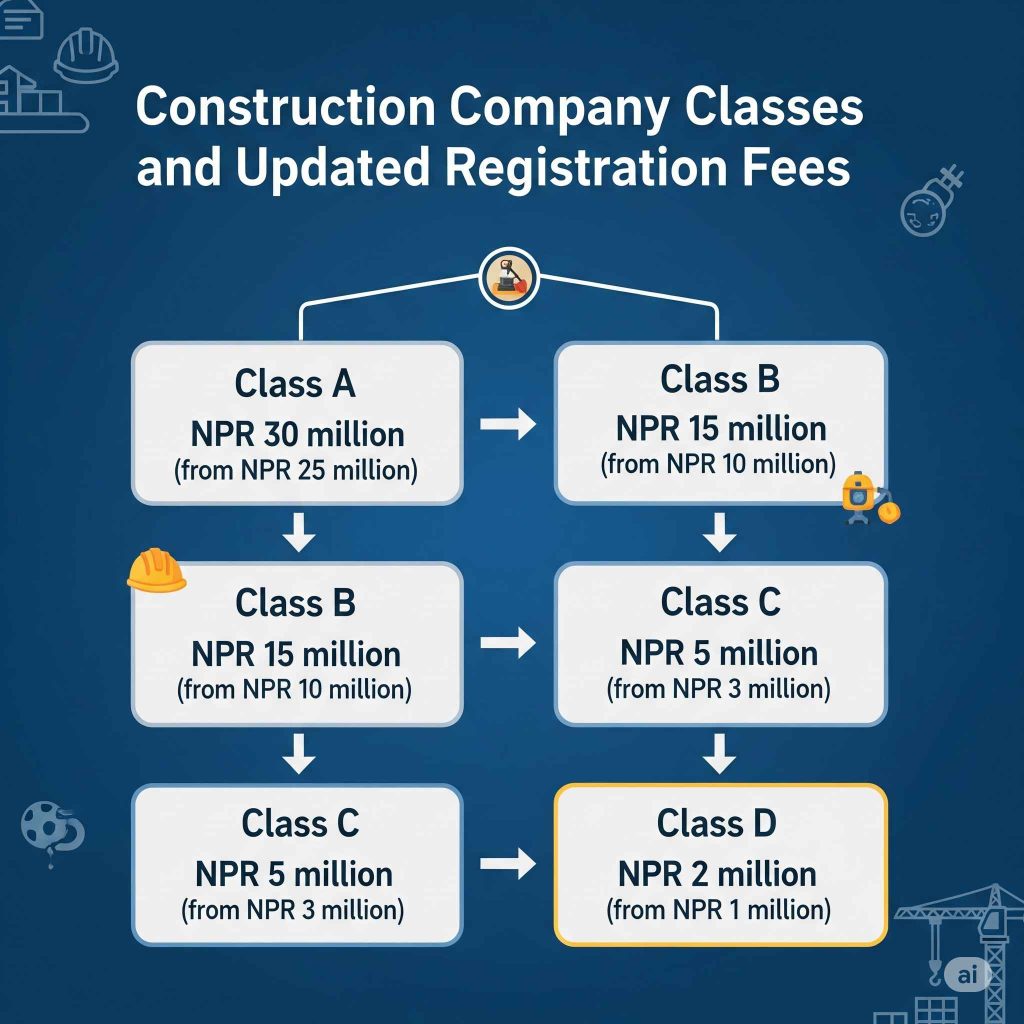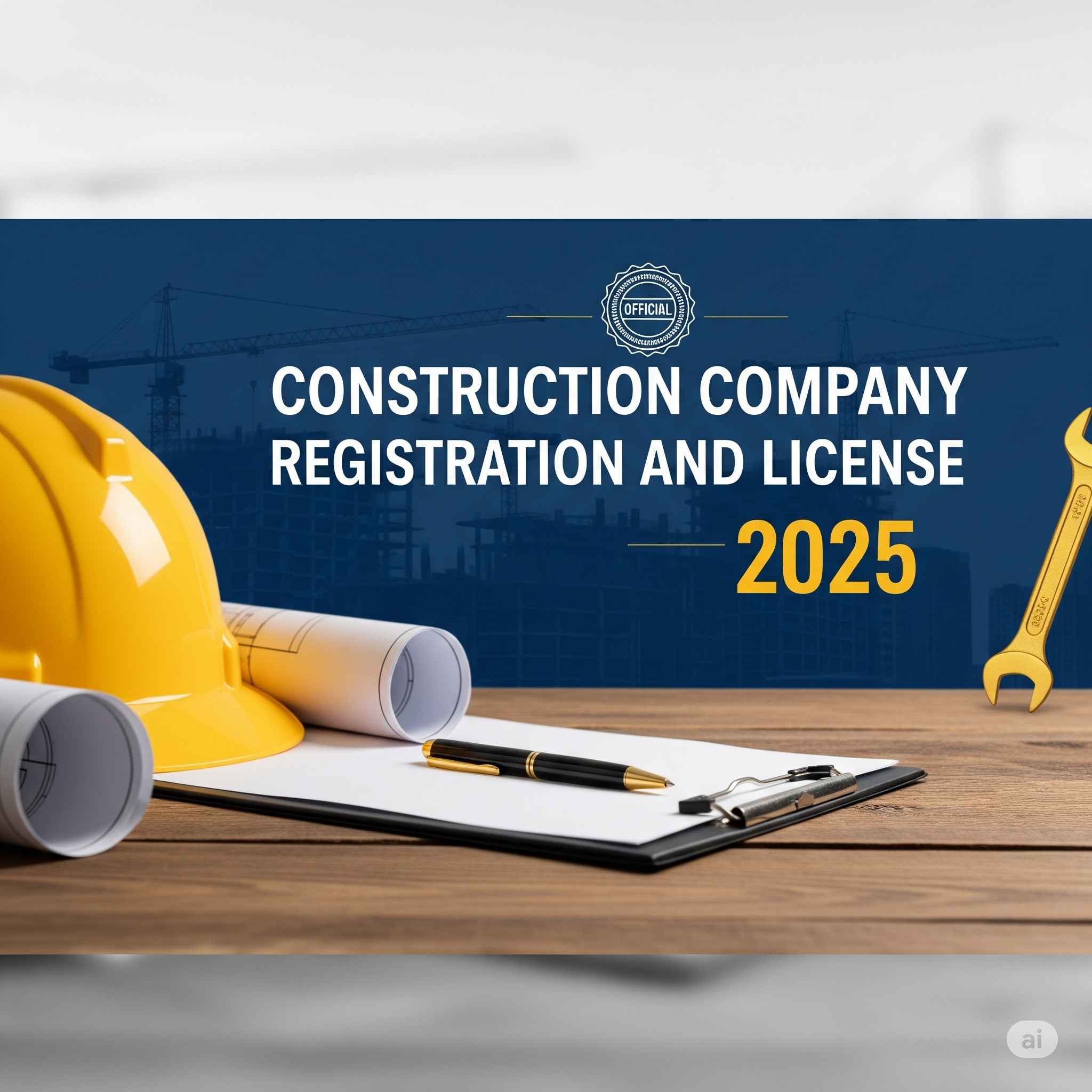Table of Contents
What is Construction Company Registration in Nepal?
Construction company registration Nepal involves a dual process requiring both corporate registration and specialized licensing. The process operates under Nepal’s structured framework that ensures construction businesses meet professional standards and regulatory compliance.
The construction license Nepal system categorizes contractors into four distinct classes (A, B, C, and D) based on project capacity, financial strength, and technical expertise. Each class serves specific market segments and project scales within Nepal’s construction industry.
Legal Framework Governing Construction Registration
Primary Acts and Regulations
The construction company registration Nepal process operates under several key legislative instruments:
Construction Business Act 2055 (1999) establishes the foundational legal framework for construction licensing and contractor regulation. This act defines licensing categories, sets minimum requirements for each class, and outlines penalties for non-compliance.
Construction Business Rules 2056 (2000) provides detailed implementation guidelines for the Construction Business Act. These rules specify documentation requirements, application procedures, and technical qualifications needed for each license class.
Public Procurement Act 2063 (2007) governs how construction companies participate in government projects. This legislation ensures transparent bidding processes and establishes contractor qualification criteria for public construction works.
Local Government Operation Act 2074 (2017) empowers local authorities to issue construction licenses and regulate building activities within their jurisdictions. This act decentralizes licensing authority and streamlines approval processes at municipal levels.
Nepal National Building Code (NBC) provides technical standards and safety requirements for construction practices. Recent updates to NBC 205:2024 introduce enhanced guidelines for low-rise reinforced concrete buildings, affecting licensing requirements and compliance standards.
Recent Changes to Construction Licensing Laws
Significant amendments have transformed construction company registration Nepal procedures in recent years:
Digital Application Systems (2024): Local municipalities implemented online application portals for D-class licenses, reducing processing time from 45 to 30 working days. This digitization improves transparency and expedites document verification processes.
Enhanced Technical Requirements (2024): New regulations mandate additional safety certifications for construction equipment. Companies must now provide mechanical engineer verification for all machinery, ensuring compliance with updated safety standards.
Increased Capital Requirements (2023): Minimum capital thresholds increased across all license classes:
- Class A: Increased to NPR 30 million (from NPR 25 million)
- Class B: Raised to NPR 15 million (from NPR 10 million)
- Class C: Enhanced to NPR 5 million (from NPR 3 million)
- Class D: Set at NPR 2 million (from NPR 1 million)
Tax Compliance Strengthening (2024): Construction companies must now submit annual tax clearance certificates and maintain current VAT registration throughout the license validity period. Non-compliance results in immediate license suspension.
Education Consultancy Registration in Nepal | Travel Agency Registration in Nepal
Construction Company License Categories and Requirements

Class A License Construction Company: Large-Scale Projects
Class A construction license permits unlimited project values and enables participation in national infrastructure development. Requirements include:
- Minimum Capital: NPR 30 million paid-up capital
- Technical Staff: Civil engineer with 5+ years experience
- Equipment: Heavy construction machinery (excavators, cranes, concrete pumps)
- Bank Guarantee: NPR 5 million minimum
- Project Capacity: No value limitations
Class B License Construction Company : Medium-Scale Development
Class B licenses accommodate medium to large-scale projects within Nepal, suitable for regional development initiatives.
- Minimum Capital: NPR 15 million paid-up capital
- Technical Staff: Civil engineer with 3+ years experience
- Equipment: Medium-scale construction equipment
- Bank Guarantee: NPR 3 million minimum
- Project Limit: Up to NPR 100 million per project
Class C License Construction Company: Community Projects
Class C licensing targets medium-scale construction works and community development projects.
- Minimum Capital: NPR 5 million paid-up capital
- Technical Staff: Civil overseer with 3+ years experience
- Equipment: Basic construction tools and machinery
- Bank Guarantee: NPR 1 million minimum
- Project Limit: Up to NPR 50 million per project
Class D License Construction Company: Entry-Level Construction
Class D licenses provide entry points for small-scale construction activities and local building projects.
- Minimum Capital: NPR 2 million paid-up capital
- Technical Staff: Civil sub-overseer
- Equipment: Essential construction tools
- Bank Guarantee: NPR 500,000 minimum
- Project Limit: Up to NPR 25 million per project
If You want To Open Travel Agency Also Read
- Travel Agency Registration in Nepal
- How to Start Travel Company in Nepal
- Travel and Tour Company Registration in Nepal
- Tourism License in Nepal
- Travel and Tourism Registration
Required Documents for Construction Company Registration
Company Registration Documents
Construction company registration Nepal requires comprehensive documentation demonstrating legal, financial, and technical capacity:
Corporate Registration Certificate: Obtained from the Office of Company Registrar (OCR), this document establishes legal entity status. The certificate must clearly specify construction activities within the company’s objectives clause.
Memorandum and Articles of Association (MOA/AOA): These foundational documents outline company structure, shareholding patterns, and operational guidelines. Construction-specific clauses must be included to enable licensing eligibility.
PAN (Permanent Account Number) Certificate: Issued by the Inland Revenue Department, the PAN certificate establishes tax identification for business operations. This document is mandatory for all construction companies regardless of license class.
VAT Registration Certificate: Value Added Tax registration is compulsory for construction company registration Nepal. The VAT certificate demonstrates compliance with tax obligations and enables participation in formal construction markets.
Financial Documentation Requirements
Tax Clearance Certificate: Annual tax clearance demonstrates ongoing compliance with fiscal obligations. Construction companies must maintain current tax clearance throughout their operational period.
Bank Guarantee Letters: Required amounts vary by license class, serving as financial security for project completion. Banks issue these guarantees based on company creditworthiness and collateral arrangements.
Audited Financial Statements: Companies must submit professionally audited financial reports demonstrating minimum capital requirements and financial stability.
Fixed Deposit Certificates: Alternative to bank guarantees, these certificates provide security deposits meeting license class requirements.
Technical Personnel Documentation
Academic Certificates: Educational qualifications of technical staff must meet license class requirements. Civil engineers require degree certificates, while overseers need diploma credentials.
Experience Certificates: Professional experience documentation validates technical staff qualifications. Experience letters must detail project involvement, duration, and responsibility levels.
Nepal Engineering Council Registration: Technical personnel must maintain current NEC registration demonstrating professional competency and ethical compliance.
Continuing Professional Development Records: Evidence of ongoing technical education and skill development activities.
Equipment and Infrastructure Documents
Equipment Ownership Certificates: Documentation proving machinery ownership or valid lease agreements. Equipment lists must correspond to license class requirements and project capacity.
Insurance Documentation: Comprehensive insurance coverage for all construction equipment, including third-party liability and operational risk protection.
Mechanical Engineer Verification: Recent regulations require registered mechanical engineers to verify equipment condition and safety compliance.
Equipment Photographs: Current photographs showing company identification and equipment specifications.
Step-by-Step Registration Process
Phase 1: Corporate Registration for Construction Company
Name Reservation: Reserve your company name at the Office of Company Registrar. The name must be unique and clearly indicate construction activities.
Document Preparation: Compile all required corporate documents including MOA, AOA, and shareholder information. Ensure construction activities are explicitly mentioned in business objectives.
OCR Registration: Submit physical copies of all documents to OCR with prescribed fees. Processing typically takes 7-15 working days for standard applications.
PAN Certificate: Obtain PAN registration from the Inland Revenue Department immediately after OCR registration. This certificate enables tax compliance and VAT registration.
Phase 2: Tax and Regulatory Compliance for Construction Company
VAT Registration: Complete mandatory VAT registration for construction companies. Submit OCR certificate, PAN certificate, and prescribed forms to IRD offices.
Ward Office Registration: Register your company at the local ward office where your business operates. This registration enables local authority coordination and compliance.
Bank Account Opening: Establish a corporate bank account meeting minimum capital requirements for your target license class.
Phase 3: License Application for Construction Company
License Class Selection: Determine appropriate license class based on business objectives, financial capacity, and technical resources.
Document Compilation: Gather all required documents specific to your chosen license class, including financial guarantees and technical staff credentials.
Municipality Application: Submit license applications to relevant municipal authorities based on your company’s registered address.
Verification Process: Authorities conduct document verification, site inspections, and technical staff interviews during the approval process.
License Issuance: Upon successful verification, construction licenses are issued typically within 30-45 working days.
Processing Time and Cost Structure
Official Processing Timeline
Document Verification: Initial document review and verification typically requires 1-2 weeks, depending on completeness and accuracy.
Authority Review: Municipal authorities require 2-4 weeks for comprehensive application assessment, including technical qualification verification.
Site Inspection: Physical verification of equipment and facilities may add 1-2 weeks to the processing timeline.
Final Approval: License issuance and certificate preparation require an additional 1-2 weeks following approval decisions.
Total Processing Time: Complete construction company registration Nepal with licensing typically requires 5-10 weeks for well-prepared applications.
Cost Breakdown by License Class
| License Class | Government Fees | Total Estimated Cost | Processing Time |
|---|---|---|---|
| Class A | NPR 20,000 | NPR 40,000-50,000 | 8-10 weeks |
| Class B | NPR 15,000 | NPR 30,000-40,000 | 6-8 weeks |
| Class C | NPR 10,000 | NPR 20,000-30,000 | 5-7 weeks |
| Class D | NPR 5,000 | NPR 10,000-20,000 | 4-6 weeks |
Additional costs may include professional service fees, document notarization, and translation expenses for foreign applicants.
Common Challenges and Solutions
Documentation Issues
Incomplete Paperwork: Many applications face delays due to missing documents or improper formatting. Maintain comprehensive checklists and verify requirements before submission.
Technical Staff Shortages: Finding qualified technical personnel meeting experience requirements can be challenging. Consider partnerships with experienced professionals or recruitment from established firms.
Equipment Acquisition: Meeting machinery requirements for higher license classes requires significant investment. Explore leasing options or equipment-sharing arrangements with established contractors.
Regulatory Compliance Challenges
Capital Requirements: Demonstrating minimum capital can be difficult for new companies. Consider phased approaches starting with D-class licenses and gradually upgrading capabilities.
Municipal Variations: Different municipalities may have varying interpretations of requirements. Consult local authorities early in the planning process.
Timeline Management: Processing delays can impact business launch schedules. Submit applications well in advance of planned operations.
Company Registration Service in Nepal
Company Registration fess in Nepal
Post-License Compliance Requirements
Annual Renewals and Maintenance
License Renewal: All construction licenses require annual renewal before expiry dates. Submit renewal applications 30 days before license expiration.
Tax Compliance: Maintain current tax clearance certificates and VAT registration throughout the license validity period.
Technical Staff Retention: Ensure continuous employment of required technical personnel. Staff changes must be reported to licensing authorities.
Equipment Maintenance: Keep all registered equipment operational and properly insured. Report significant equipment changes to authorities.
Ongoing Professional Development
Training Requirements: Participate in mandatory skill development programs organized by government agencies and professional bodies.
Industry Standards: Stay updated with changing construction standards, building codes, and safety requirements.
Project Reporting: Submit periodic reports on ongoing projects and compliance with contract terms.
Professional Services and Expert Guidance
Engaging professional services can significantly streamline the construction company registration Nepal process:
Legal Consultation: Experienced legal professionals ensure compliance with all regulatory requirements and help navigate complex procedures.
Accounting Services: Professional accountants assist with financial statement preparation, tax compliance, and capital requirement documentation.
Engineering Consultancy: Technical consultants help meet personnel requirements and equipment specification compliance.
Document Translation: For foreign investors, professional translation services ensure accurate document submission.
Frequently Asked Questions
What is the minimum capital required for D-class construction license? The minimum capital requirement for D-class construction license is NPR 2 million paid-up capital, along with essential construction tools and equipment.
How long does construction company registration take in Nepal? Complete construction company registration Nepal with D-class licensing typically takes 4-6 weeks, while higher classes may require 8-10 weeks for processing.
Can foreign investors register construction companies in Nepal? Yes, foreign investors can establish construction companies in Nepal by complying with Foreign Investment and Technology Transfer Act requirements and obtaining necessary work permits.
What happens if construction license expires? Expired licenses require immediate renewal applications with applicable penalties. Operating without valid licenses can result in project suspensions and legal consequences.
Are there upgrade options between license classes? Companies can upgrade license classes by meeting higher capital requirements, technical staff qualifications, and equipment specifications through formal upgrade applications.
FAQS on Construction License in Nepal
What is the process for registering a construction company in Nepal?
The process for registering a construction company in Nepal involves the following steps:
Step 1: Name Reservation – Reserve a unique company name through the Office of the Company Registrar (OCR) to ensure availability
Step 2: Company Registration – Submit required documents including Articles of Association (AOA) and Memorandum of Association (MOA) to the OCR
Step 3: PAN Registration – Obtain a Permanent Account Number certificate from the Inland Revenue Department for tax purposes
Step 4: VAT Registration – Register for Value Added Tax, which is mandatory for construction companies in Nepal
Step 5: Open Business Bank Account – Establish a dedicated business account with a reputable Nepali bank
Step 6: Local Ward Office Registration – Register your company at the local ward office based on your business location
Step 7: Construction License Application – Apply for the appropriate construction license class (typically starting with D Class)
The entire registration process typically takes 4-6 weeks to complete, assuming all documentation is properly prepared and submitted
What are the different types of construction licenses available in Nepal?
Nepal’s construction licensing system categorizes contractors into four distinct classes based on project scale, financial capacity, and technical expertise:
Class A License – For large-scale national and international projects
Minimum capital requirement: NPR 30 million
Technical requirement: At least one civil engineer with 5 years of experience
Equipment requirement: Ownership or lease of heavy construction machinery
Project capacity: Can undertake projects of any scale without financial limitations
Class B License – For medium to large-scale projects within Nepal
Minimum capital requirement: NPR 15 million
Technical requirement: At least one civil engineer with 3 years of experience
Equipment requirement: Ownership or lease of medium-scale construction equipment
Project capacity: Can handle projects up to NPR 100 million in value
Class C License – For medium-scale construction works
Minimum capital requirement: NPR 5 million
Technical requirement: At least one civil overseer with 3 years of experience
Equipment requirement: Basic construction tools and machinery
Project capacity: Suitable for projects valued between NPR 4-32 million
Class D License – Entry-level license for small-scale construction activities
Minimum capital requirement: NPR 2 million
Technical requirement: At least one civil sub-overseer
Equipment requirement: Essential construction tools
Project capacity: Ideal for small projects under NPR 4 million
What documents are required for construction company registration in Nepal?
To register a construction company in Nepal, you need to prepare the following documents:
Company Registration Documents:
Articles of Association (AOA)
Memorandum of Association (MOA)
Certificate of Registration from OCR
Tax and Regulatory Certificates:
PAN (Permanent Account Number) certificate
VAT registration certificate
Tax clearance certificate for the previous fiscal year
Local ward office registration certificate
Technical Documentation:
Academic certificates of technical personnel (engineers, overseers)
Experience certificates of technical staff
Equipment ownership or lease documents
VAT bills for equipment/machines
Insurance papers for the machines
Photographs of machines with company name clearly written
Verification of machines by a registered mechanical engineer
Shareholders/Proprietors Documentation:
Citizenship certificates of all shareholders/partners
Academic certificate of at least one shareholder/proprietor
Recently taken passport-sized photographs of all shareholders
Bank guarantee or fixed deposit certificate as per license class
What are the costs associated with obtaining a construction license in Nepal?
The costs for obtaining a construction license in Nepal vary by license class and include both government fees and associated expenses:
Class A License Costs:
Government fee: NPR 20,000
Total estimated cost: NPR 40,000-50,000
Includes government fees, documentation expenses, and professional service charges
Class B License Costs:
Government fee: NPR 15,000
Total estimated cost: NPR 30,000-40,000
Includes government fees, documentation expenses, and professional service charges
Class C License Costs:
Government fee: NPR 10,000
Total estimated cost: NPR 20,000-30,000
Includes government fees, documentation expenses, and professional service charges
Class D License Costs:
Government fee: NPR 5,000
Total estimated cost: NPR 10,000-20,000
Includes government fees, documentation expenses, and professional service charges
Additional costs may apply for document notarization, translation services, and equipment verification. These fees are payable to the Department of Urban Development and Building Construction or relevant local authority.
How long does it take to obtain a construction license in Nepal?
The timeline for obtaining a construction license in Nepal varies depending on the license class and completeness of documentation:
Overall Processing Timeline:
Total processing time typically ranges from 5 to 10 weeks
Assumes all requirements are met and no additional information is requested
Breakdown of Processing Steps:
Initial document submission and verification: 1-2 weeks
Review by the licensing authority: 2-4 weeks
Site inspection (if required): 1-2 weeks
Final approval and license issuance: 1-2 weeks
Factors Affecting Timeline:
Completeness of submitted documents
License class (higher classes may require more scrutiny)
Workload of the licensing authority
Need for additional inspections or verifications
Response time to requests for additional information
For new business owners, it’s advisable to start the application process well in advance of any planned projects to account for potential delays.
What are the requirements for foreign investors wanting to start a construction company in Nepal?
Foreign investors interested in establishing a construction company in Nepal must meet specific requirements and follow a structured approval process:
Minimum Investment Requirement:
Minimum capital investment: NPR 20 million (approximately USD 155,000)
Must be infused through proper banking channels
Legal Framework:
Governed by Foreign Investment and Technology Transfer Act, 2019 (FITTA)
Construction is permitted (excluded from negative list of restricted industries)
Must comply with Companies Act, 2006 and Industrial Enterprises Act, 2020
Approval Process Steps:
Step 1: Obtain foreign investment approval from Department of Industry (DOI) or Investment Board of Nepal (IBN)
Step 2: Incorporate company at Office of Company Registrar
Step 3: Complete tax registration at Inland Revenue Office
Step 4: Register business at local ward office
Step 5: Register industry at DOI
Step 6: Obtain non-blacklist certificate from Credit Information Bureau
Step 7: Get Nepal Rastra Bank approval to infuse investment
Step 8: Infuse investment in local bank and obtain Investment Certificate
Step 9: Record infused investment at Nepal Rastra Bank
Required Documents for Foreign Investors:
Project report with market, technical, and financial aspects
Company profile and registration documents of foreign investor
Corporate resolution to invest in Nepal
Financial credibility certificate from home country bank
Documents stating source of investment and time schedule
Power of attorney for local representative
Passports of foreign investors/directors
Commitment letter not to repatriate investment for one year
The entire FDI and incorporation process typically takes 1-2 months to complete.
What is the construction license renewal process in Nepal?
Construction licenses in Nepal must be renewed annually, and the renewal process follows specific guidelines:
License Validity Period:
Construction licenses are valid for 1 (one) fiscal year
Must be renewed within 3 months after the end of the fiscal year
Renewal Process Steps:
Step 1: Determine renewal requirements for your license class
Step 2: Gather all required renewal documents
Step 3: Complete the renewal application form
Step 4: Pay the prescribed renewal fees
Step 5: Submit application package to relevant authority
Step 6: Await verification and approval
Step 7: Collect renewed license
Required Documents for Renewal:
Completed renewal application form
Original current/expiring license
Company registration certificate
PAN certificate
Tax clearance certificate for previous fiscal year
Audited financial statements
Proof of renewal fee payment
Updated equipment documentation (if applicable)
Renewal Timeline:
Simple renewals: 1-2 weeks
Complex renewals: 4-6 weeks
Recommended to start renewal process 30-45 days before expiration
Renewal Fees:
Vary by license class (typically lower than initial registration fees)
Late renewal penalties may apply if renewed after the 3-month window
What are the common challenges faced by construction companies in Kathmandu and how can they be overcome?
Construction companies operating in Kathmandu face several unique challenges that require strategic solutions:
Regulatory Compliance Challenges:
Complex and frequently changing regulations
Multiple approvals required from different authorities
Solution: Engage legal consultants specializing in construction law; maintain regular communication with regulatory bodies; stay updated on regulatory changes through industry associations
Documentation and Bureaucracy Issues:
Lengthy documentation processes
Bureaucratic delays in approvals
Solution: Prepare thorough documentation in advance; follow up regularly with authorities; consider using professional registration services; maintain digital copies of all documents
Technical and Equipment Requirements:
Difficulty in meeting equipment ownership requirements
Challenges in hiring qualified technical personnel
Solution: Consider equipment leasing options; partner with equipment rental companies; invest in training programs for technical staff; offer competitive compensation to attract qualified professionals
Financial Constraints:
High minimum capital requirements for higher license classes
Cash flow challenges during project execution
Solution: Start with lower license classes and upgrade gradually; explore joint venture opportunities; maintain good relationships with financial institutions; implement effective project financial management
Local Competition and Market Access:
Intense competition from established local companies
Difficulty in securing initial projects
Solution: Focus on niche markets; build strong relationships with clients; emphasize quality and reliability; consider subcontracting initially to build experience and reputation
Infrastructure and Logistical Issues:
Transportation challenges in Kathmandu
Limited storage facilities for equipment and materials
Solution: Plan logistics carefully; establish strategic partnerships with suppliers; consider satellite storage facilities; implement just-in-time inventory management
Conclusion
Construction company registration Nepal requires careful planning, comprehensive documentation, and regulatory compliance. Success depends on understanding legal frameworks, meeting technical requirements, and maintaining ongoing compliance obligations.
The construction industry offers significant opportunities for growth and development within Nepal’s expanding infrastructure sector. Proper registration and licensing provide the foundation for legitimate business operations and competitive advantage in the marketplace.
For personalized guidance on construction company registration Nepal, consult experienced legal professionals who understand current regulations and can ensure successful license acquisition for your specific business requirements.
Ready to start your construction company in Nepal? Contact qualified legal advisors and Law Firm in Nepal to navigate the registration process efficiently and establish your construction business with confidence in Nepal’s growing market.
Also Read
- FDI Process in Nepal
- Company Registration in Nepal
- Shram Swikriti Nepal
- Education Consultancy Registration in Nepal
- Divorce Process in Nepal
- Marriage Registration in Nepal
- Branch Office registration in Nepal
- Joint venture Agreement in Nepal
- Travel Agency Registration in Nepal
- Import Export License in Nepal
- Manpower Company Registration in Nepal




